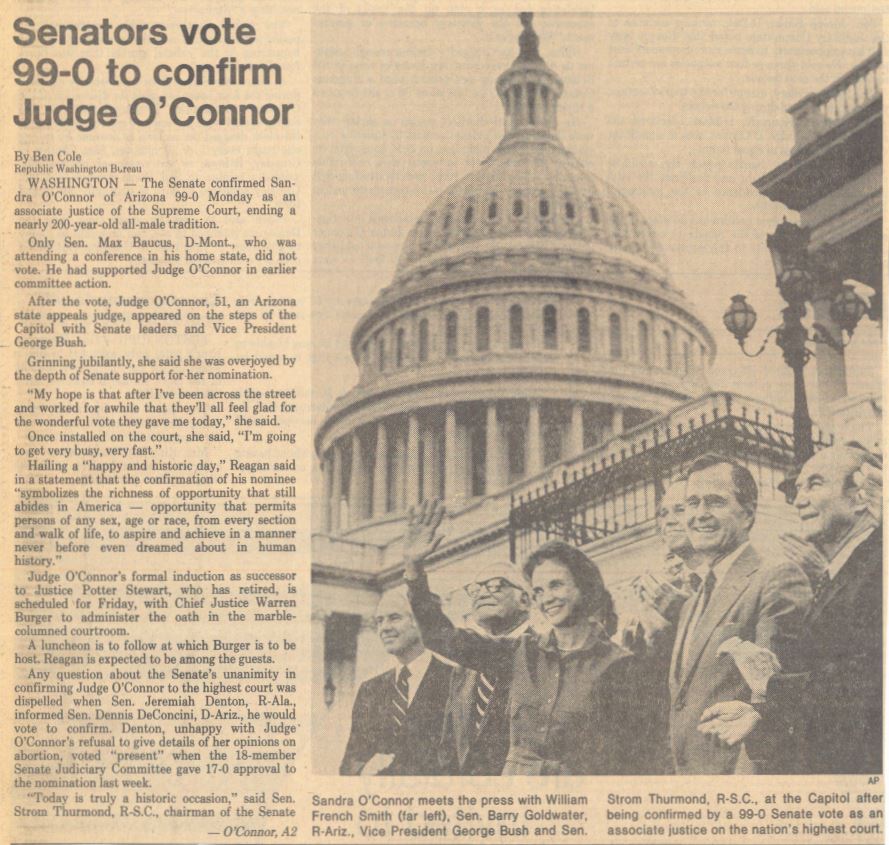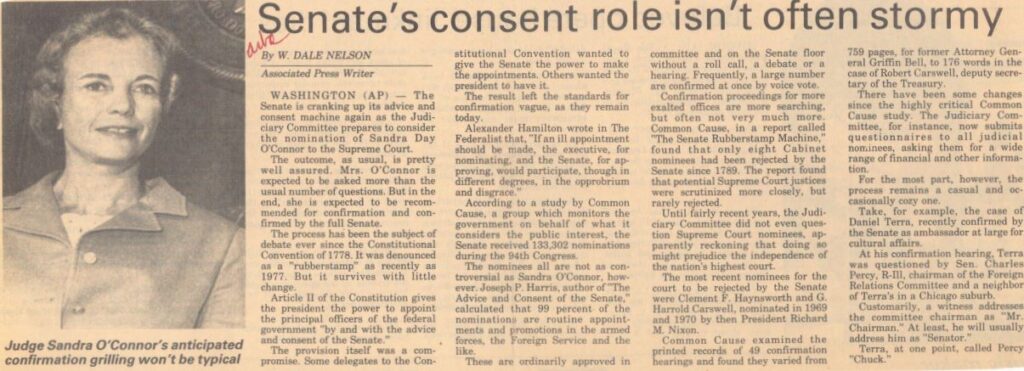Senators vote 99-0 to confirm Judge O’Connor
WASHING TON – The Senate confirmed Sandra O’Connor of Arizona 99-0 Monday as an associate justice of the Supreme Court, ending a nearly 200-year-old all-male tradition. Only Sen. Max Baucus, D-Mont., who was attending a conference in his home state, did not vote. He had supported Judge O’Connor in earlier committee action. After the vote, Judge O’Connor, 51, an Arizona state appeals judge, appeared on the steps of the Capitol with Senate leaders and Vice President George Bush. Grinning jubilantly, she said she was overjoyed by the depth of Senate support for-her nomination. “My hope is that after I’ve been across the street and worked for awhile that they’ll all feel glad for the wonderful vote they gave me today,” she said. Once installed on the court, she said, “I’m going to get very busy, very fast.” Hailing a “happy and historic day,” Reagan said in a statement that the confirmation of his nominee “symbolizes the richness of opportunity that still abides in America – opportunity that permits persons of any sex, age or race, from every section and walk of life, to aspire and achieve in a manner never before even dreamed about in human history.” Judge O’Connor’s formal induction as successor to Justice Potter Stewart, who has retired, is scheduled for Friday, with Chief Justice Warren Burger to administer the oath in the marblecolumned courtroom. A luncheon is to follow at which Burger is to be host. Reagan is expected to be among the guests. Any question about the Senate’s
Senators Greet Choice Favorably; Abortion Foes Irate
WASHINGTON – Antiabortion groups yesterday denounced the nomination of Judge Sandra D. O’Connor to the Supreme Court and vowed to fight her confirmation, but no Senate members immediately stepped forward to lead such a fight and the initial reaction to the nomination was favorable. “I commend the President for the courage of his decision,” said Sen. Howard H. Baker Jr., the majority leader. “I am delighted with his choice, and I pledge my full support for her confirmation by the full Senate.” The National Right to Life Committee, an amalgam of anti-abortion lobbying groups, said it would mobilize its members to “prevail upon senators to oppose this nomination” on the ground that O’Connor was “pro-abortion” as a member of the Arizona Legislature. “We feel betrayed by the President,” said Paul Brown, chairman of the Life Amendment Political Action Committee, who contended that Mr. Reagan violated a campaign pledge to support anti-abortion positions and appointees. In contrast, the National Organization for Women hailed the nomination as a “victory for women’s rights.” Eleanor C. Smeal, president of the organization, rated the judge as “sensitive to women’s rights, a moderate on women’s rights.” The only sitting Supreme Court justice to comment was Harry Blackmun. Blackmun said the appointment “has been anticipated for some time.” He said he did not know O’Connor personally, but had heard “very favorable” reports about her. Any ‘Senate opposition was thought likely to be led by
Senate Set to Give Advice, Consent on O’Connor
WASHINGTON (AP) The Senate is cranking up its advice and consent machine again as the Judiciary Committee prepares to consider the nomination of Sandra Day O’Connor to the Supreme Court. The outcome, as usual, is pretty well assured. Mrs. O’Connor is expected to be asked more than the usual number of questions. But in the end, she is expected to be recommended for confirmation and confirmed by the full Senate. The process has been the subject of debate ever since the Constitutional Convention of 1778. [sic] It was denounced as a ”rubberstamp” as recently as 1977. But it survives with little change. Article II of the Constitution gives the president the power to appoint the principal officers of the federal government “by and with the advice and consent of the Senate.” The provision itself was a compromise. Some delegates to the Constitutional Convention wanted to give the Senate the power to make the appointments. Others wanted the president to have it. The result left the standards for confirmation vague, as they remain today. Alexander Hamilton wrote in The Federalist that, “If an ill appointment should be made, the executive for nominating, and the Senate, for approving, would participate, though in different degrees, in the opprobrium and disgrace.” According to a study by Common Cause, a group which monitors the government on behalf of what it considers the public interest, the Senate received 133,302 nominations during the 94th Congress. . The nominees all are not as controvers
Senate’s consent role isn’t often stormy
WASHINGTON (AP ) – The Senat e is cranking up its advice and consent machine again as the Judi – ciary Committee prepares to consider t h e n omi n ation of Sa ndr a Da y O’Connor to th e Suprem e Court. The outcome, as usual, is pretty well as su re d . Mr s. O’Conno r is expected to be asked more th an th e usual nu mber of question s. But in th e end, she is expected to be recommende d for confirmation and confirme d by the full Senate . The process has been the subject of debate ever since th e Constitu tional Convent ion of 1778. It was denounc ed as a “rubberstam p” as recently as 1977. But it su rvives wit h little change . Article II of the Constitut ion gives the president the power to appoint the principal officers of the federal governme nt “by an d with the advice and consent of the Senate.” The prov ision itse lf was a compromise . Some delegates to the Con stitu tio nal Convention wanted to give the Senate the power to ma ke the appointme nt s. Others wanted the president to have it . The result left the standa rds for confirmation vague, as they remai n today. Alexander Ham ilton wrote in The Federa list that, “If an ill appointment should be made, the executive , for nominating, and the Senate, for approving, would partici pate, thoug h in different degrees, in the opprobr ium and disgrace.” According to a st udy by Common Cause, a group which monitors the government on beha lf of what it considers the public interest, the Senate received 133,302 nominat ions
Senate Endorses O’Connor
PHOENIX – The Arizona Senate Friday approved by a 29-1 vote a House memorial endorsing the nomination of Arizona Appeals Court Judge Sandra O’Connor to the U.S. Su~reme Court. The memorial said O’Connor is “an eminently qualified jurist, having served as a trial court judge, and is presently serving as an appellate court Judge.” Sen. Manuel Pena, D-Phoenix, cast the dissenting vote.
Senate confirms O’Connor as Supreme Court justice
WASHINGTON (UPI) – In a vote hailed as a turning point in U.S. political history, the Senate voted unanimously Monday to confirm Sandra Day O’Connor as the nation’s first woman justice of the Supreme Court. The vote was 99-0. Sen . Max Baucus, D-Mont., was the only absentee. Cautioned against any demonstration, spectators thronging the Senate gallery kept silent during the 20-minute roll call and the announcement of the outcome . Outside the Capitol, a huge crowd greeted Judge O’Connor with cheers as she arrived with Attorney General William French Smith and posed for pictures with Vice President George Bush and Senate leaders. “I’m absolutely overjoyed with the expression of support from the Senate, and my hope is that 10 years from now, after I’ve been across the street at work for a while, they will feel glad they gave me the wonderful vote they did today,” Judge O’Connor said. “I’ll certainly work hard to make that hl!.ppen.” President Re&gan promptly issued a statement saying, “This is truly a happy and histor~c day fof America,” and expressmg gratitude for the unanimous vote. He called Judge O’Connor “a very warm and brilliant woman” and said he is sure “the court and the nation will benefit both from her lifetime of work, service ~nd experience in the legal profession, …



